新概念英语第一册91-92 课件(共30张PPT)
文档属性
| 名称 | 新概念英语第一册91-92 课件(共30张PPT) | 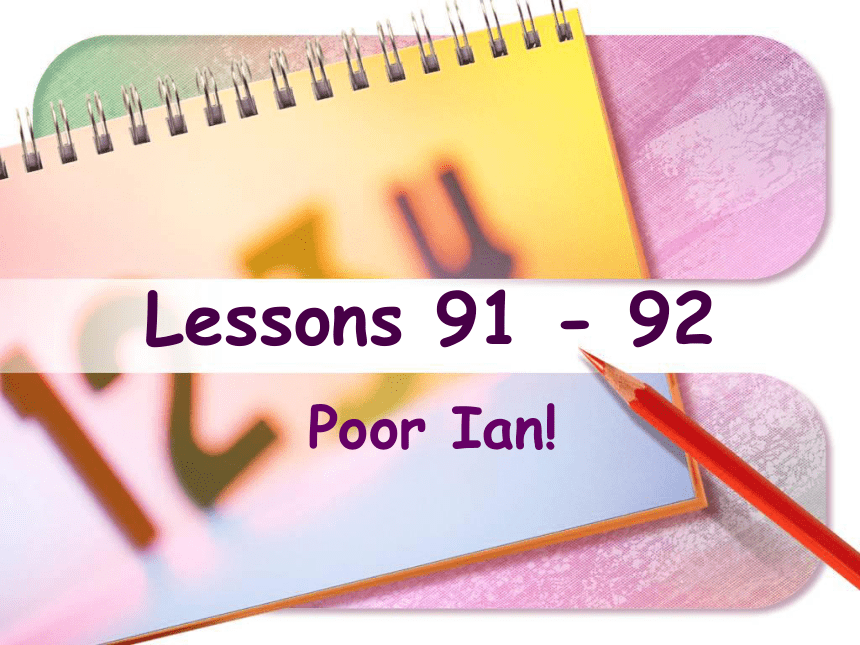 | |
| 格式 | ppt | ||
| 文件大小 | 1.2MB | ||
| 资源类型 | 教案 | ||
| 版本资源 | 新概念英语 | ||
| 科目 | 英语 | ||
| 更新时间 | 2024-03-08 08:08:07 | ||
图片预览

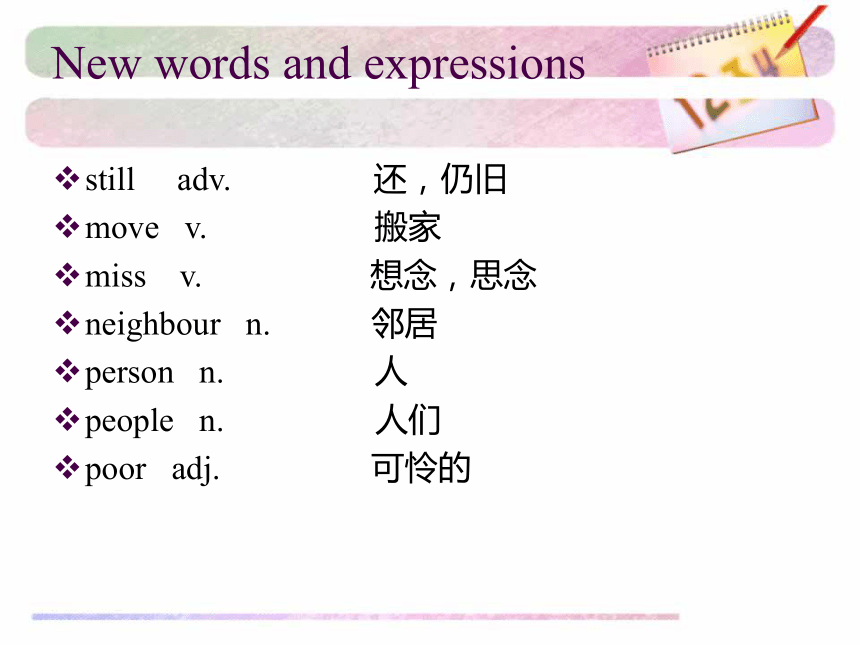
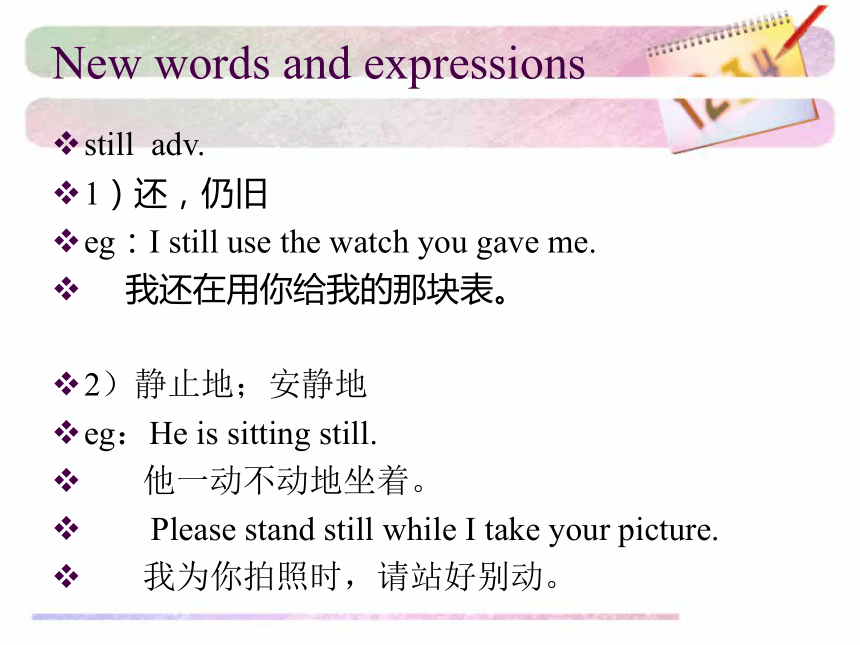
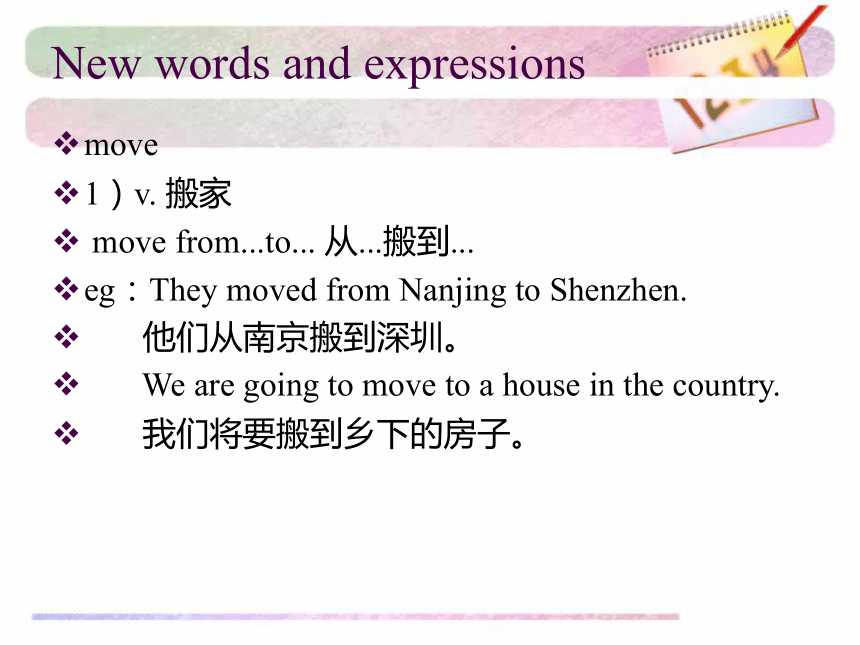
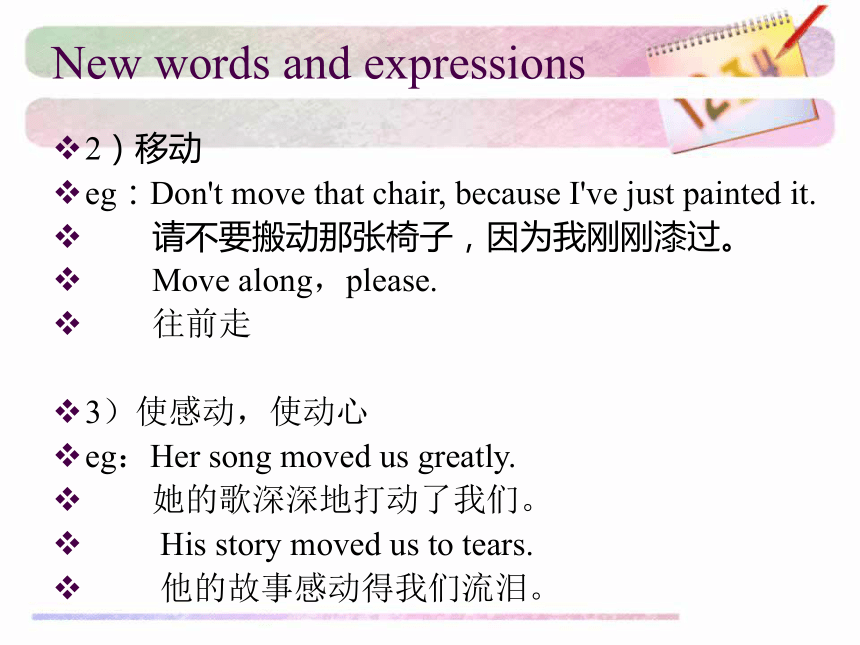
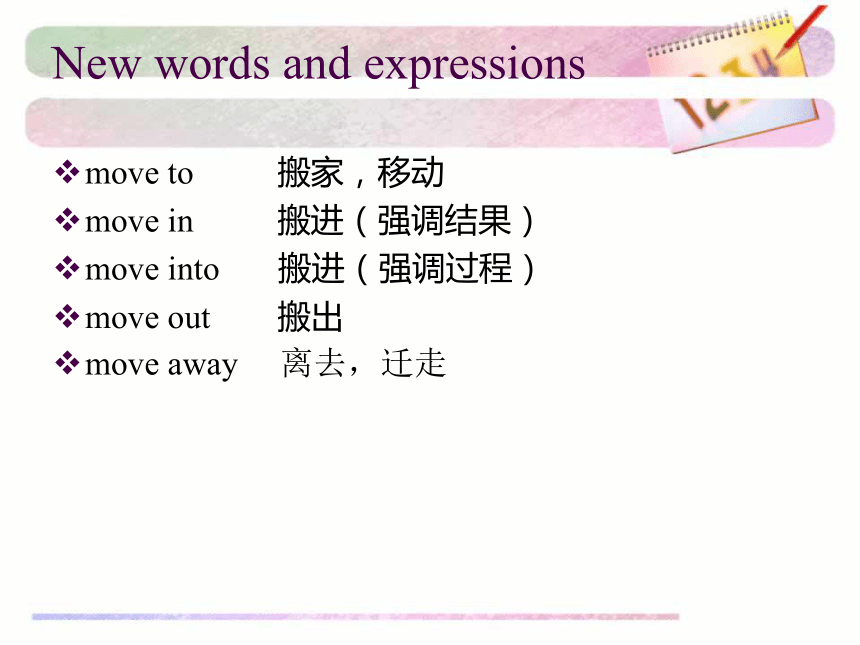
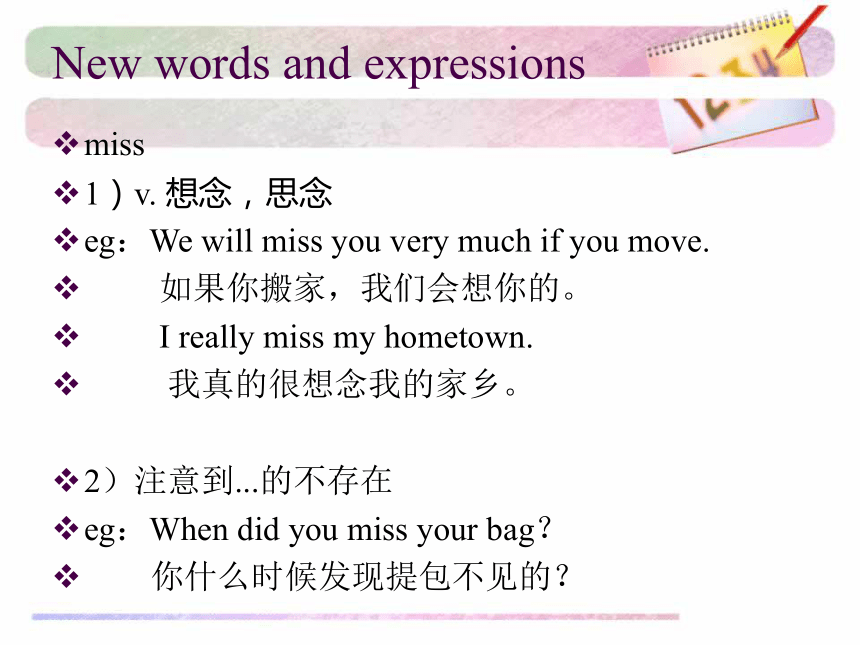
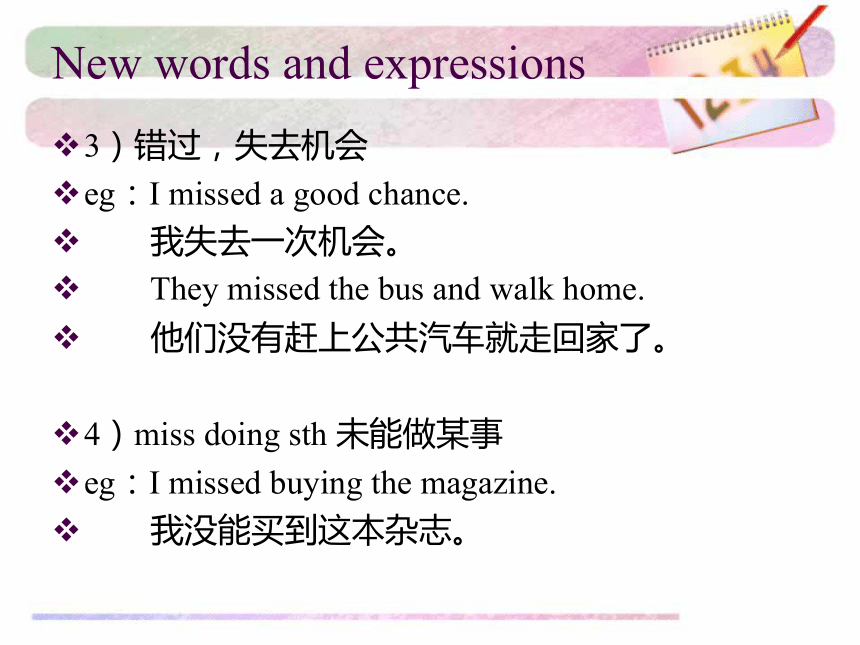
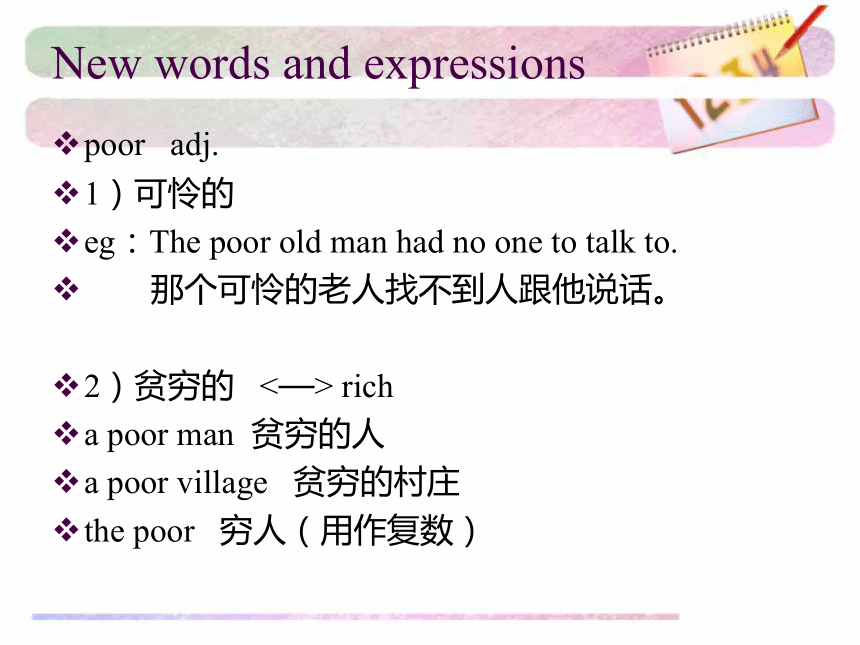
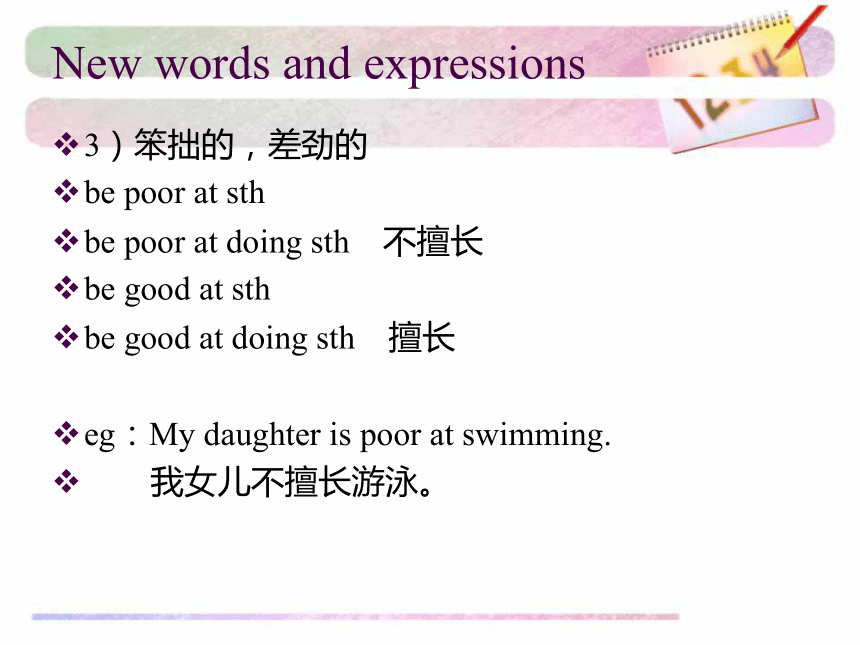
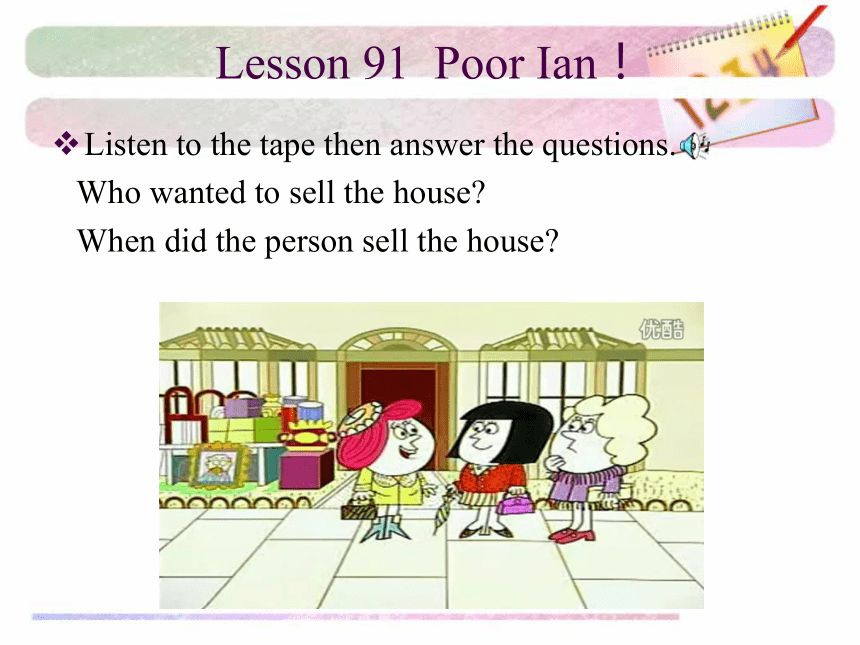
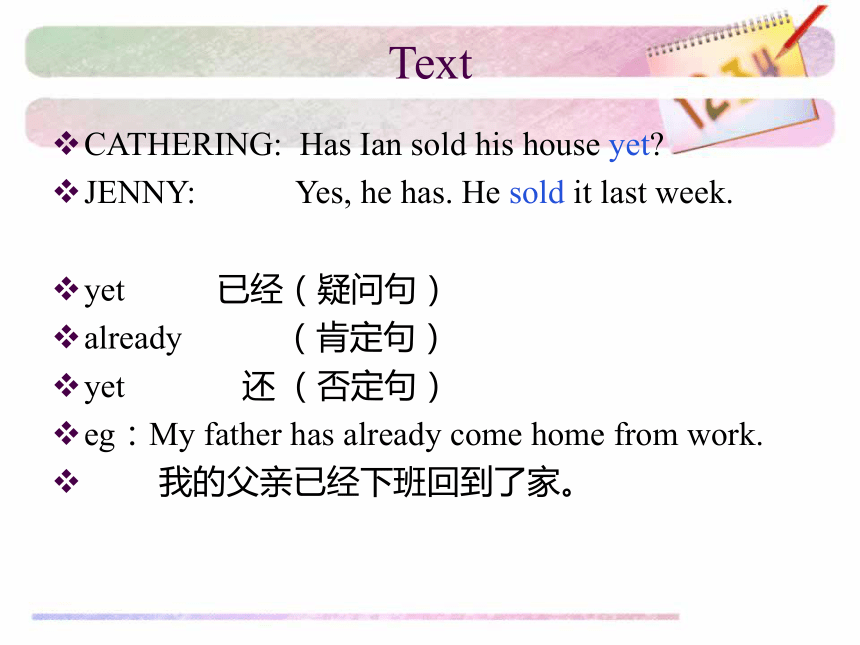
文档简介
(共30张PPT)
Lessons 91 - 92
Poor Ian!
New words and expressions
still adv. 还,仍旧
move v. 搬家
miss v. 想念,思念
neighbour n. 邻居
person n. 人
people n. 人们
poor adj. 可怜的
still adv.
1)还,仍旧
eg:I still use the watch you gave me.
我还在用你给我的那块表。
2)静止地;安静地
eg:He is sitting still.
他一动不动地坐着。
Please stand still while I take your picture.
我为你拍照时,请站好别动。
New words and expressions
move
1)v. 搬家
move from...to... 从...搬到...
eg:They moved from Nanjing to Shenzhen.
他们从南京搬到深圳。
We are going to move to a house in the country.
我们将要搬到乡下的房子。
New words and expressions
2)移动
eg:Don't move that chair, because I've just painted it.
请不要搬动那张椅子,因为我刚刚漆过。
Move along,please.
往前走
3)使感动,使动心
eg:Her song moved us greatly.
她的歌深深地打动了我们。
His story moved us to tears.
他的故事感动得我们流泪。
New words and expressions
move to 搬家,移动
move in 搬进(强调结果)
move into 搬进(强调过程)
move out 搬出
move away 离去,迁走
New words and expressions
miss
1)v. 想念,思念
eg:We will miss you very much if you move.
如果你搬家,我们会想你的。
I really miss my hometown.
我真的很想念我的家乡。
2)注意到...的不存在
eg:When did you miss your bag?
你什么时候发现提包不见的?
New words and expressions
3)错过,失去机会
eg:I missed a good chance.
我失去一次机会。
They missed the bus and walk home.
他们没有赶上公共汽车就走回家了。
4)miss doing sth 未能做某事
eg:I missed buying the magazine.
我没能买到这本杂志。
New words and expressions
poor adj.
1)可怜的
eg:The poor old man had no one to talk to.
那个可怜的老人找不到人跟他说话。
2)贫穷的 <—> rich
a poor man 贫穷的人
a poor village 贫穷的村庄
the poor 穷人(用作复数)
New words and expressions
3)笨拙的,差劲的
be poor at sth
be poor at doing sth 不擅长
be good at sth
be good at doing sth 擅长
eg:My daughter is poor at swimming.
我女儿不擅长游泳。
New words and expressions
Lesson 91 Poor Ian!
Listen to the tape then answer the questions.
Who wanted to sell the house
When did the person sell the house
CATHERING: Has Ian sold his house yet
JENNY: Yes, he has. He sold it last week.
yet 已经(疑问句)
already (肯定句)
yet 还 (否定句)
eg:My father has already come home from work.
我的父亲已经下班回到了家。
Text
CATHERING: Has he moved to his new house yet
JENNY: No, not yet. He's still here. He's
going to move tomorrow.
move to 搬家到...
eg:All her family have moved to the US.
她全家人都已经搬到美国去住了。
move in 搬进(强调结果)
eg:His new neighbour moved in last week.
他的新邻居上周搬了进来。
Text
完整的回答:
He hasn't moved
to his new house
yet.
CATHERING: When Tomorrow morning
JENNY: No. Tomorrow afternoon. I'll miss
him. He has always been a good
neighbour.
LIDA: He's a very nice person. We'll all
miss him.
CATHERING: When will the new people move into
this house
Text
all指三者或三者
以上
both用来指两个
JENNY: I think that they'll move in the day after
tomorrow.
LINDA: Will you see Ian today, Jenny
eg:Do you believe that we will win the game?
你相信我们将赢得这场比赛吗?
eg:Will she bring the letter to me?
她会给我带来这封信吗?
Text
(由that引导作think的宾语)
一般将来时的一般疑问句
JENNY: Yes, I will.
LINDA: Please give him my regards.
= give my regards to him
give sb sth = give sth to sb 把...给某人(双宾语)
regards(pl.) 致意,问候
Text
CATHERING: Poor Ian! He didn't want to leave this
house.
JENNY: No, he didn't want to leave, but his
wife did!
poor adj. 可怜的 poor girl 可怜的女孩
poor adj. 贫穷的 the poor country 贫穷的国家
Text
是的,他不想离开。
leave 离开
leave...for... 离开...去...
eg:When will you leave China for England?
你什么时候离开中国去英国?
leave for 动身去...
eg:I will leave for England on September 1st.
我准备9月1号动身去英国。
Text
课文词组总结
Have/Has...yet? 已经...了吗?
last week 上个星期
move to 搬到
tomorrow morning 明天上午
tomorrow afternoon 明天下午
the day after tomorrow 后天
miss sb 想念某人
move in 搬进来(状态,结果)
move into 搬进来(动作)
give sb my regards 代我向某人问候
Grammar--宾语从句
句子的宾语一般是由名词或代词充当的,宾语一般在动词或介词的后面。
eg:I want an apple.
(名词 an apple作want的宾语)
I like you.
(代词you作like的宾语)
in front of the window
(名词window作in front of的宾语)
用作宾语的从句叫做宾语从句,即充当宾语成份的不是一个单词或词组,而是一个句子。
主语从句:一个句子充当主语
定语从句:一个句子作定语
状语从句:充当状语成份的是一个句子
表语从句:充当表语成份的是一个句子
Grammar--宾语从句
宾语从句跟在两类词后
1.表示人的情感或心理活动的形容词。
afraid/sure/sorry/glad
结构:主语 + be + 此类词 + 宾语从句
eg:I'm afraid that I can't help you at the moment.
They are sure that they will win the match.
He is sorry that he didn't go yesterday.
We are glad that you can come.
Grammar--宾语从句
2.普通动词
think/know/believe/say/hope/understand
结构:主语(人) + 这类动词 + 宾语从句
eg:I think that you will pass the exam.
I believe I can fly.
引导宾语从句的关联词有从属连词,疑问代词,疑问副词,缩合连接代词,缩合连接副词等。
Grammar--宾语从句
I am afraid that you can't see him today.
我恐怕你今天见不到他。
(关联词是从属连词that)
在非正式文体中关联词that常被省去。
eg:I hope you can come tomorrow.
我希望你明天能够来。
(that省略)
Grammar--宾语从句
eg:I don't know if you can help me.
不知道你是否能帮助我。
(从属连词if)
eg:I wonder what he is writing to me about.
我不知道他要给我写信说些什么事。
(疑问代词what)
Grammar--宾语从句
1)一般将来时表示将来某一时刻的动作、状态以及打算。该时态一般与表示将来意义的时间状语连用。
tomorrow 明天
this month 本月
the day after tomorrow 后天
next week 下周
in two days' time 两天之后
from now on 从现在起
in the future 将来
Grammar--一般将来时
2)一般将来时的形式
主语 + will/shall + 动词原形
will用于的所有人称,shall可用第一人称 I 和 we (在当代英语中,不管什么人称,人们都喜欢用will)
3)一般疑问句是将助动词will/shall提前,否定句在will/shall的后面加not。
否定缩写:shan't = shall not
won't = will not
Grammar--一般将来时
除了will/shall外,还可以用其他方法表示将来。在口语中,be going to do 比will/shall更为普通。
1)用来表示说话人的意思或打算
eg:She is going to travel by air.
她打算乘飞机旅行。
2)也可用来表示有迹象某事即将发生
eg:It's going to rain.
将要下雨了。
Grammar--一般将来时
可与将来时连用的时间短语有:
今天
this morning
this afternoon
this evening
tonight
明天
tomorrow morning
tomorrow afternoon
tomorrow evening
Grammar--一般将来时
后天
the day after tomorrow 后天
the night after next 后天夜里
其他
in the morning 在上午
in the afternoon 在下午
in the evening 在晚上
Homework
把今天所讲的单词、词组以及句型掌握好,要听写
把今天所讲的语法要重点掌握
熟背课文
Lessons 91 - 92
Poor Ian!
New words and expressions
still adv. 还,仍旧
move v. 搬家
miss v. 想念,思念
neighbour n. 邻居
person n. 人
people n. 人们
poor adj. 可怜的
still adv.
1)还,仍旧
eg:I still use the watch you gave me.
我还在用你给我的那块表。
2)静止地;安静地
eg:He is sitting still.
他一动不动地坐着。
Please stand still while I take your picture.
我为你拍照时,请站好别动。
New words and expressions
move
1)v. 搬家
move from...to... 从...搬到...
eg:They moved from Nanjing to Shenzhen.
他们从南京搬到深圳。
We are going to move to a house in the country.
我们将要搬到乡下的房子。
New words and expressions
2)移动
eg:Don't move that chair, because I've just painted it.
请不要搬动那张椅子,因为我刚刚漆过。
Move along,please.
往前走
3)使感动,使动心
eg:Her song moved us greatly.
她的歌深深地打动了我们。
His story moved us to tears.
他的故事感动得我们流泪。
New words and expressions
move to 搬家,移动
move in 搬进(强调结果)
move into 搬进(强调过程)
move out 搬出
move away 离去,迁走
New words and expressions
miss
1)v. 想念,思念
eg:We will miss you very much if you move.
如果你搬家,我们会想你的。
I really miss my hometown.
我真的很想念我的家乡。
2)注意到...的不存在
eg:When did you miss your bag?
你什么时候发现提包不见的?
New words and expressions
3)错过,失去机会
eg:I missed a good chance.
我失去一次机会。
They missed the bus and walk home.
他们没有赶上公共汽车就走回家了。
4)miss doing sth 未能做某事
eg:I missed buying the magazine.
我没能买到这本杂志。
New words and expressions
poor adj.
1)可怜的
eg:The poor old man had no one to talk to.
那个可怜的老人找不到人跟他说话。
2)贫穷的 <—> rich
a poor man 贫穷的人
a poor village 贫穷的村庄
the poor 穷人(用作复数)
New words and expressions
3)笨拙的,差劲的
be poor at sth
be poor at doing sth 不擅长
be good at sth
be good at doing sth 擅长
eg:My daughter is poor at swimming.
我女儿不擅长游泳。
New words and expressions
Lesson 91 Poor Ian!
Listen to the tape then answer the questions.
Who wanted to sell the house
When did the person sell the house
CATHERING: Has Ian sold his house yet
JENNY: Yes, he has. He sold it last week.
yet 已经(疑问句)
already (肯定句)
yet 还 (否定句)
eg:My father has already come home from work.
我的父亲已经下班回到了家。
Text
CATHERING: Has he moved to his new house yet
JENNY: No, not yet. He's still here. He's
going to move tomorrow.
move to 搬家到...
eg:All her family have moved to the US.
她全家人都已经搬到美国去住了。
move in 搬进(强调结果)
eg:His new neighbour moved in last week.
他的新邻居上周搬了进来。
Text
完整的回答:
He hasn't moved
to his new house
yet.
CATHERING: When Tomorrow morning
JENNY: No. Tomorrow afternoon. I'll miss
him. He has always been a good
neighbour.
LIDA: He's a very nice person. We'll all
miss him.
CATHERING: When will the new people move into
this house
Text
all指三者或三者
以上
both用来指两个
JENNY: I think that they'll move in the day after
tomorrow.
LINDA: Will you see Ian today, Jenny
eg:Do you believe that we will win the game?
你相信我们将赢得这场比赛吗?
eg:Will she bring the letter to me?
她会给我带来这封信吗?
Text
(由that引导作think的宾语)
一般将来时的一般疑问句
JENNY: Yes, I will.
LINDA: Please give him my regards.
= give my regards to him
give sb sth = give sth to sb 把...给某人(双宾语)
regards(pl.) 致意,问候
Text
CATHERING: Poor Ian! He didn't want to leave this
house.
JENNY: No, he didn't want to leave, but his
wife did!
poor adj. 可怜的 poor girl 可怜的女孩
poor adj. 贫穷的 the poor country 贫穷的国家
Text
是的,他不想离开。
leave 离开
leave...for... 离开...去...
eg:When will you leave China for England?
你什么时候离开中国去英国?
leave for 动身去...
eg:I will leave for England on September 1st.
我准备9月1号动身去英国。
Text
课文词组总结
Have/Has...yet? 已经...了吗?
last week 上个星期
move to 搬到
tomorrow morning 明天上午
tomorrow afternoon 明天下午
the day after tomorrow 后天
miss sb 想念某人
move in 搬进来(状态,结果)
move into 搬进来(动作)
give sb my regards 代我向某人问候
Grammar--宾语从句
句子的宾语一般是由名词或代词充当的,宾语一般在动词或介词的后面。
eg:I want an apple.
(名词 an apple作want的宾语)
I like you.
(代词you作like的宾语)
in front of the window
(名词window作in front of的宾语)
用作宾语的从句叫做宾语从句,即充当宾语成份的不是一个单词或词组,而是一个句子。
主语从句:一个句子充当主语
定语从句:一个句子作定语
状语从句:充当状语成份的是一个句子
表语从句:充当表语成份的是一个句子
Grammar--宾语从句
宾语从句跟在两类词后
1.表示人的情感或心理活动的形容词。
afraid/sure/sorry/glad
结构:主语 + be + 此类词 + 宾语从句
eg:I'm afraid that I can't help you at the moment.
They are sure that they will win the match.
He is sorry that he didn't go yesterday.
We are glad that you can come.
Grammar--宾语从句
2.普通动词
think/know/believe/say/hope/understand
结构:主语(人) + 这类动词 + 宾语从句
eg:I think that you will pass the exam.
I believe I can fly.
引导宾语从句的关联词有从属连词,疑问代词,疑问副词,缩合连接代词,缩合连接副词等。
Grammar--宾语从句
I am afraid that you can't see him today.
我恐怕你今天见不到他。
(关联词是从属连词that)
在非正式文体中关联词that常被省去。
eg:I hope you can come tomorrow.
我希望你明天能够来。
(that省略)
Grammar--宾语从句
eg:I don't know if you can help me.
不知道你是否能帮助我。
(从属连词if)
eg:I wonder what he is writing to me about.
我不知道他要给我写信说些什么事。
(疑问代词what)
Grammar--宾语从句
1)一般将来时表示将来某一时刻的动作、状态以及打算。该时态一般与表示将来意义的时间状语连用。
tomorrow 明天
this month 本月
the day after tomorrow 后天
next week 下周
in two days' time 两天之后
from now on 从现在起
in the future 将来
Grammar--一般将来时
2)一般将来时的形式
主语 + will/shall + 动词原形
will用于的所有人称,shall可用第一人称 I 和 we (在当代英语中,不管什么人称,人们都喜欢用will)
3)一般疑问句是将助动词will/shall提前,否定句在will/shall的后面加not。
否定缩写:shan't = shall not
won't = will not
Grammar--一般将来时
除了will/shall外,还可以用其他方法表示将来。在口语中,be going to do 比will/shall更为普通。
1)用来表示说话人的意思或打算
eg:She is going to travel by air.
她打算乘飞机旅行。
2)也可用来表示有迹象某事即将发生
eg:It's going to rain.
将要下雨了。
Grammar--一般将来时
可与将来时连用的时间短语有:
今天
this morning
this afternoon
this evening
tonight
明天
tomorrow morning
tomorrow afternoon
tomorrow evening
Grammar--一般将来时
后天
the day after tomorrow 后天
the night after next 后天夜里
其他
in the morning 在上午
in the afternoon 在下午
in the evening 在晚上
Homework
把今天所讲的单词、词组以及句型掌握好,要听写
把今天所讲的语法要重点掌握
熟背课文
同课章节目录
